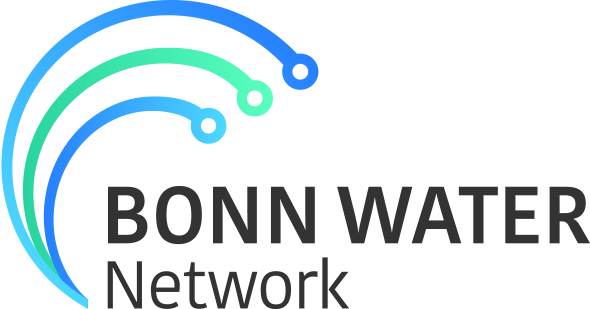
The digital launch event of the Bonn Water Network on 17 November 2020 attracted over 150 people from around the world. The network consists of seven Bonn-based institutions with longstanding experience on water and related issues; besides the German Development Institute / Deutsches Institut für Entwicklungspolitik (DIE), these include the Bonn International Center for Conversion (BICC); two institutes affiliated to Bonn University, the Institute of Geography (GIUB) and the Center for Development Research (ZEF); the International Water Management Institute (IWMI), and two UN institutions, the United Nations Institute for Environment and Human Security (UNU-EHS) and the Secretariat of the United Nations Convention to Combat Desertification (UNCCD).
In her welcoming remarks, the speaker of the network Dr Annabelle Houdret highlighted that the partners can build on 15 years of cooperation in their ‘Water Lecture’ series and a longstanding experience in applied research in water projects around the world. She emphasized the collaborative spirit of the network and its partners: “We elaborate solutions to water problems together with our partners, be they local farmers in developing countries, national water management institutions, ministries in Europe or in the global South, or international organizations – we believe that across countries, hierarchies and disciplines, every single actor has his or her own field of expertise that contributes to finding sustainable solutions to the water crisis.”
In his welcoming remarks, Stefan Wagner, Director of International Affairs & Global Sustainability at the city of Bonn, stressed the excellent embedding of the network in the city’s hub of international cooperation and sustainable development. Prof Dr Jakob Rhyner, Scientific Director of the Bonn Alliance for Sustainability Research / Innovation Campus Bonn (ICB), also welcomed the creation of the network as a valuable and timely complement to the existing research alliances and ensured a smooth cooperation between the ICB and the Bonn Water Network.
In the event, also the directors of the Bonn Water Network’s member institutions provided short inputs via video messages and gave an overview on challenges of the water crisis and the contributions of their respective teams to the network.
Finally, researchers of the Bonn Water Network shared their experiences with water challenges around the world and gave insights into the work they conduct with partner institutions. They illustrated how groundwater depletion affects the implementation of the Sustainable Development Goals in Jordan (Dr Ines Dombrowsky, DIE), which effects increasing hydrological variabilities and extremes have on uncertainties and risks in Myanmar (Prof Dr Mariele Evers, GIUB), how land and water management can be transformed in a sustainable way in Morocco (Dr. Birgit Kemmerling, BICC), and how research can support transboundary water management in Togo and Benin (Dr Yvonne Walz, UNU-EHS). Moreover, Dr Jonathan Lautze from IWMI explained the interdependencies between the provision of water, energy and food in Central Asia and Africa, Dipesh Chapagain (ZEF) analysed the impact of future climate extremes in western Nepal on water resources, and Dr Daniel Tsegai (UNCCD) detailed how his institution helps implementing proactive approaches to drought at the global and local levels.
The Bonn Water Network will have its own website in 2021, information on its activities is also available on DIE’s new Webspecial Water Governance. The next event of the network will be its presentation at the ‘International Water Colloquium’ organized by UNU-FLORES, in collaboration with Technische Universität Dresden (TU Dresden), and the University of Bonn. On January 26, 2021, Prof Dr Anna-Katharina Horndige, director of the German Development Institute / Deutsches Institut für Entwicklungspolitik (DIE), will held next the Water Lecture of the Bonn Water Network on the topic ‘Sustainable Ocean Governance’.
For further information on the network, please contact the speaker Annabelle Houdret (Annabelle.houdret@die-gdi.de).
Article by the German Development Institute / Deutsches Institut für Entwicklungspolitik.